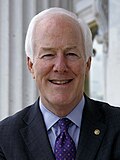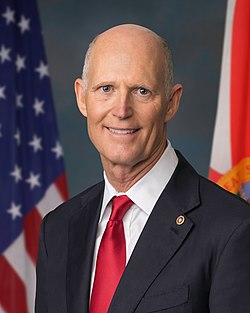Top Qs
Timeline
Chat
Perspective
2024 Senate Republican Conference leadership election
From Wikipedia, the free encyclopedia
Remove ads
On November 13, 2024, Republican members of the United States Senate held an election to determine the next leader of the Senate Republican Conference, who was to become the next majority leader of the United States Senate at the start of the 119th U.S. Congress. Republicans had regained control of the chamber in the 2024 election, flipping one Independent and three Democratic seats and securing a 53–47 majority.
Incumbent Republican leader Mitch McConnell of Kentucky, who has served in the position since 2007, announced in February 2024 that he would retire from the role at the start of the next session, triggering the election to succeed him. The election was held by secret ballot, with only those expected to serve as Republican senators in the 119th Congress allowed to cast a vote.
Senators John Cornyn, Rick Scott and John Thune were the only official candidates on the ballot. After receiving the fewest number of votes on the first ballot, Scott was eliminated. Thune won the election on the second ballot, after receiving a majority of the ballots cast.[1]
Remove ads
Overview
Senator Mitch McConnell, the leader of the Senate Republican Conference since 2007, announced in February 2024 that he would retire from his leadership position following the 2024 United States Senate elections.[2] Those elections resulted in a Republican majority in the Senate, meaning the winner of the leadership election would become Senate majority leader.[3]
The Senate majority leader serves as the chief representative of their party in the Senate, and is considered the most powerful member of the Senate. The Senate's executive and legislative business is also managed and scheduled by the majority leader.[4]
Key issues for the election include the proposed implementation of term-limits for the Senate Republican leader, a proposed expansion of the leaders power over appointments to Senate committees and how to deal with then-president-elect Donald Trump's agenda.[5][6][7]
The secret ballot election was held on November 13 by a conference of Republican senators. A candidate must receive a majority of votes cast to become leader; if no candidate receives a majority, the lowest vote getter is eliminated and the senators vote again.[8]
Remove ads
Candidates
Summarize
Perspective
The following candidates declared their intent to run.
Endorsements
John Cornyn
- Senators
- Josh Hawley, Senator from Missouri (2019–present)[12]
Rick Scott
- Senators
- Marsha Blackburn, Senator from Tennessee (2019–present)[13]
- Ted Cruz, Senator from Texas (2013–present)[14]
- Bill Hagerty, Senator from Tennessee (2021–present)[15]
- Ron Johnson, Senator from Wisconsin (2011–present)[16]
- Mike Lee, Senator from Utah (2011–present)[17]
- Rand Paul, Senator from Kentucky (2011–present)[15]
- Marco Rubio, Senator from Florida (2011–2025)[18]
- Tommy Tuberville, Senator from Alabama (2021–present)[19]
- U.S. Representatives
- Byron Donalds, U.S. Representative from FL-19 (2021–present)[17]
- Marjorie Taylor Greene, U.S. Representative from GA-14 (2021–present)[20]
- Anna Paulina Luna, U.S. Representative from FL-13 (2023–present)[21]
- Notable individuals
- Steve Bannon, former executive chairman of Breitbart News[22]
- Glenn Beck, conservative political commentator[23]
- Tucker Carlson, conservative political commentator[15]
- Benny Johnson, conservative political commentator[18]
- Jesse Kelly, anti-communist radio host[24]
- Megyn Kelly, conservative political commentator[25]
- Robert F. Kennedy Jr., environmental lawyer and anti-vaccine activist[18]
- Charlie Kirk, conservative political activist[18]
- Laura Loomer, far-right political activist[16]
- Elon Musk, businessman and investor[26]
- Vivek Ramaswamy, American entrepreneur[27]
- Matt Schlapp, conservative political activist[27]
John Thune
- Senators
- Kevin Cramer, Senator from North Dakota (2019–present)[28]
- Steve Daines, Senator from Montana (2015–present)[29]
- John Hoeven, Senator from North Dakota (2011–present)[28]
- Markwayne Mullin, Senator from Oklahoma (2023–present)[7]
- Mike Rounds, Senator from South Dakota (2015–present)[30]
Remove ads
Results
References
Wikiwand - on
Seamless Wikipedia browsing. On steroids.
Remove ads






